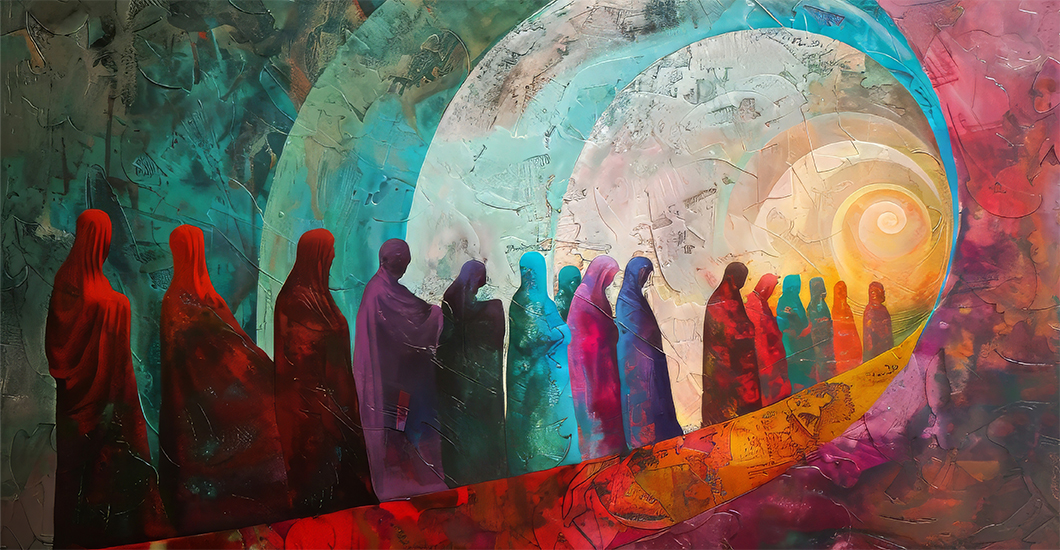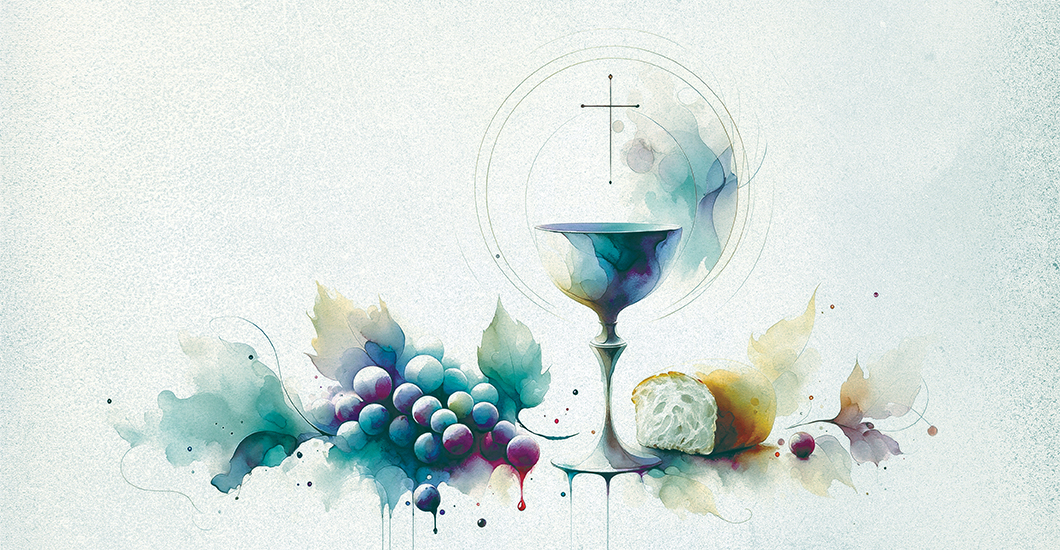Trending Articles
The Mercy of Hospitality
Travel to any community in the country and you will likely find motels, hotels and restaurants that are happy to provide you – for a price – a room for the night or a hot meal. So extensive is the modern hospitality industry that some schools even offer degrees in managing these services. It is all a very convenient and useful social good.
Traditionally, however, the concept of hospitality has had a rather different meaning, one that did not involve the payment of money in return. This older concept of hospitality, observed in many cultures, more resembled the gratuitous reception that is given now to family, friends, neighbors, co-workers and other guests.
On this smaller, more personal level, it is an almost ingrained ethic today to ask a visitor – whether in the home or the office – “Welcome. Would you like something to drink? Something to eat?” A good host wants his or her guest to be comfortable. We open our homes also for holidays, parties, graduations, funerals, and we host wedding receptions, offering food, drink, sometimes entertainment or a place to stay, and just as important, camaraderie.
Mothers and grandmothers are especially renowned for their hospitality, not only to their own family members, but to others as well. How many of us remember going to a friend’s house when we were growing up and being asked if we were staying for dinner?
This hospitality extends outside the home as well, expressed in etiquette and social conventions of holding the door for others, giving up your seat to a pregnant woman or older person, offering a portion of your lunch to someone who has none. Our parishes too should be places of warm welcome and sustenance. In these small ways, these small mercies, we help make the world a little bit better.
This attitude of hospitality and warm welcome, sometimes expressed as, “Mi casa es su casa – My house is your house,” was in older times even freely extended to complete strangers and travelers, rich and poor alike, including foreigners. Before the age of interstate highways and pervasive hotels and restaurants, it was understood to be a vital social virtue, religious ethic and moral duty for both the elite and common people to open their doors and show generosity and courtesy to those away from home and widows and orphans too. Of course, the clergy and monasteries of the Church opened their spiritual homes as well to provide hospitality to people in need.
The roots of this hospitality go back to the ancient world. Particularly in places like the desert regions of the Middle East, access to water, food and shelter was a matter of life and death for a traveler. God in his mercy had provided these necessities to his chosen people and so he instructs them, “You shall treat the stranger who sojourns with you as the native among you, and you shall love him as yourself, for you were strangers in the land of Egypt” (Leviticus 19:34). The Lord commands this kindness be show to even foreigner travelers despite foreign domination being a constant prime concern of Israel.
Holy Scripture provides an example of the hospitality we should practice when the Lord appeared to Abraham in the form of three men. Abraham waited on this manifestation of the Trinity, providing food, shelter from the hot sun, and water for the three visitors to wash their feet. The Lord then blesses Abraham and his wife Sarah with a son in their old age (Genesis 18:1-16). In the First Book of Kings, we read how the widow Zarephath received the prophet Elijah and, even though she was in dire straits with her food nearly gone, she gave him a portion. Again God gives his blessing – Zarephath is given enough food to survive and when her son dies, the Lord restores him to life (1 Kings 17:8-24).
“Do not neglect hospitality, for through it some have unknowingly entertained angels,” we are told (Hebrews 13:2). Having been received in mercy by the Lord, hospitality is among the essential qualities that he expects of his good and faithful people, including concern not only for family and friends, but for those we do not know, for domestic travelers, foreign immigrants and refugees, and for all who are downtrodden, vulnerable and marginalized.
Whether it is in the home, at work, in the Church, or in our nation, as a matter of justice and gratitude for what we have been given, we are called to be welcoming and hospitable to others. By these acts of gratuitousness, we help build up the kingdom of God.
Cardinal Donald Wuerl (www.cardinalsblog.adw.org) serves as Archbishop of the Diocese of Washington, D.C. He is known for his teaching ministry and is involved in many education, health care, and social service organizations. Cardinal Wuerl is the author of numerous articles and over a dozen books. He serves on a number of national and international bodies and is chairman of the Board of Trustees of the Basilica of the National Shrine of the Immaculate Conception, chancellor of The Catholic University of America, chairman of the board of the Pope John Paul II Cultural Foundation and also of The Papal Foundation. He serves on various Vatican Congregations, Councils, and Commissions including those for the Doctrine of the Faith and for Bishop. Cardinal Wuerl has served as chairman of numerous committees of the United States Conference of Catholic Bishops. Reprinted with permission.
Related Articles
The greatest evangelist is, of course, Jesus himself, and there is no better presentation of Jesus’ evangelical technique than Luke’s masterful narrative concerning the disciples on the road to Emmaus. The story opens with two people going the wrong way. In Luke’s Gospel, Jerusalem is the spiritual center of gravity— it is the locale of the Last Supper, the Cross, the Resurrection and the sending of the Spirit. It is the charged place where the drama of Salvation unfolds. So in walking away from the capital city, these two erstwhile disciples of Jesus are going against the grain. Jesus joins them on their journey—though we are told that they are prevented from recognizing Him—and He asks them what they are talking about. Throughout His ministry, Jesus associated with sinners. He stood shoulder to shoulder in the muddy waters of the Jordan with those seeking forgiveness through the baptism of John; over and again, He ate and drank with disreputable types, much to the chagrin of the self-righteous; and at the end of His life, He was crucified in between two thieves. Jesus hated sin, but He liked sinners and was consistently willing to move into their world and to engage them on their terms. And this is a first great evangelical lesson. The successful evangelist does not stand aloof from the experience of sinners, passing easy judgment on them, praying for them from a distance; on the contrary, she loves them so much that she joins them and deigns to walk in their shoes and to feel the texture of their experience. Prompted by Jesus’ curious questions, one of the travelers, Cleopas by name, recounts all of the 'things' concerning Jesus of Nazareth: “He was a prophet mighty in word and deed before God and all the people; our leaders, though, put Him to death; we thought He would be the redeemer of Israel; this very morning, there were reports that He had risen from the dead.” Cleopas has all of the 'facts' straight; there is not one thing he says about Jesus that is wrong. But his sadness and his flight from Jerusalem testify that he doesn’t see the picture. I love the clever and funny cartoons in the New Yorker magazine, but occasionally, there is a cartoon I just don’t understand. I’ve taken in all of the details, I’ve seen the main characters and the objects around them, I’ve understood the caption. Yet, I don’t see why it’s funny. And then there comes a moment of illumination: though I haven’t seen any further detail, though no new piece of the puzzle has emerged, I discern the pattern that connects them together in a meaningful way. In a word, I 'get' the cartoon. Having heard Cleopas’ account, Jesus say: “Oh, how foolish you are! How slow of heart to believe all that the prophets said.” And then He opens the Scriptures to them, disclosing the great Biblical patterns that make sense of the 'things' that they have witnessed. Without revealing to them any new detail about Himself, Jesus shows them the form, the overarching design, the meaning—and through this process they begin to 'get' Him: their hearts are burning within them. This is the second great evangelical lesson. The successful evangelist uses the Scriptures in order to disclose the divine patterns and ultimately the Pattern who is made flesh in Jesus. Without these clarifying forms, human life is a hodge-podge, a blur of events, a string of meaningless happenings. The effective evangelist is a man of the Bible, for the Scripture is the means by which we 'get' Jesus Christ and, through Him, our lives. The two disciples press Him to stay with them as they draw near the town of Emmaus. Jesus sits down with them, takes bread, says the blessing, breaks it and gives it to them, and in that moment they recognize Him. Though they were, through the mediation of Scripture, beginning to see, they still did not fully grasp who He was. But in the Eucharistic moment, in the breaking of the bread, their eyes are opened. The ultimate means by which we understand Jesus Christ is not the Scripture but the Eucharist, for the Eucharist is Christ Himself, personally and actively present. The embodiment of the paschal mystery, the Eucharist, is Jesus’ love for the world unto death, His journey into godforsakenness in order to save the most desperate of sinners, His heart broken open in compassion. And this is why it is through the lens of the Eucharist that Jesus comes most fully and vividly into focus. And thus we see the third great evangelical lesson. Successful evangelists are persons of the Eucharist. They are immersed in the rhythms of the Mass; they practice Eucharistic adoration; they draw the evangelized to a participation in the body and blood of Jesus. They know that bringing sinners to Jesus Christ is never primarily a matter of personal witness, or inspiring sermonizing, or even exposure to the patterns of the Scripture. It is primarily a matter of seeing the broken heart of God through the broken bread of the Eucharist. So prospective evangelists, do what Jesus did. Walk with sinners, open the Book, break the Bread.
By: Bishop Robert Barron
MoreAs Catholics, we have heard from the time we were little: “Offer it up.” From a little headache to a very serious emotional or physical hurt, we were encouraged to ‘offer it up.’ It wasn't until I was an adult that I pondered the meaning and purpose of the phrase, and understood it as ‘redemptive suffering.’ Redemptive suffering is the belief that human suffering, when accepted and offered up in union with the Passion of Jesus, can remit the just punishment for one's sins or the sins of another. In this life, we are going to suffer various minor and major physical, mental, emotional, and spiritual trials. We can choose to grumble about it or we can surrender it all and unite our suffering with Jesus’ Passion. It can be redemptive not only for us, we can even help someone open their heart to receive Jesus' healing and forgiveness. We may never know in this life how offering up our sufferings has helped someone else break free of the bondages that have held them for so long. Sometimes, God allows us to experience the joy of seeing someone break loose from a life of sin because we offered up our suffering for them. We can offer up our sufferings even for the poor souls in purgatory. When we finally arrive in Heaven, imagine those we were praying for and offering up our sufferings greeting us and thanking us. Redemptive suffering is one of those areas that can be difficult to fully understand, but when we look at Scripture and what Jesus taught and how his followers lived, we can see that it is something that God is encouraging us to do. Jesus, help me each day to offer up my little and big sufferings, difficulties, annoyances, and unite them to You on the Cross.
By: Connie Beckman
MoreA gift that you can access from anywhere in the world, and guess what? It’s free not just for you but for everyone! Imagine that you are lost in a deep pit of darkness and hopelessly groping around. Suddenly, you see a great light and someone reaching out to rescue you. What a relief! The overwhelming peace and joy can’t be fully expressed in words. The Samaritan woman felt like this when she met Jesus at the well. He told her: “If you knew the gift of God, and who it is that is saying to you: ‘Give me a drink,’ you would have asked Him, and He would have given you living water.” (John 4:10) As soon as she heard these words, the woman realized that she had been waiting her whole life for this. “Give me this water, so that I may never be thirsty,” she implored: (John 4:15) It was only then, in response to her request and thirst for knowledge of the Messiah, that Jesus revealed Himself to her: “I am He, the One who is speaking to you.” (John 4:26) He is the living water that quenches every thirst—the thirst for acceptance, the thirst for understanding, the thirst for forgiveness, the thirst for justice, the thirst for happiness, and most importantly, the thirst for love, God’s love. Until You Ask… The gift of Christ’s presence and mercy is available for everyone. “God proves His love for us in that, while we were still sinners, Christ died for us.” (Romans 5:8) He died for every sinner so that by the Blood of Christ, we may be cleansed from our sin and be reconciled with God. But, like the Samaritan woman, we need to ask Jesus. As Catholics, we can easily do this through the Sacrament of Penance, confessing our sins and being reconciled with God when the priest absolves us from sin, using the power given by God to act in persona Christi (in the person to Christ). It gives me great peace to frequent this Sacrament because the more I do it, the more I become receptive to the Holy Spirit. I can feel Him speaking through my heart, helping me to discern good from evil, growing in virtue as I flee from vice. The more frequently I repent of my sins and turn back to God, the more sensitive I become to the presence of Jesus in the Holy Eucharist. I become conscious of His presence in those who have received Him in Holy Communion. I feel His warmth in my heart when the priest walks past me with the ciborium filled with the Consecrated Host. Let’s be honest about it. Many people line up for Communion, but very few people line up for Confession. It is sad that many people are missing out on such a very important source of grace to strengthen us spiritually. Here are a few things that help me get the most out of Confession. Be Prepared A thorough examination of the conscience is necessary before Confession. Prepare by going through the commandments, the seven deadly sins, the sins of omission, the sins against purity, charity, etc. For a sincere confession, the conviction of sin is a prerequisite, so it is always helpful to ask God to enlighten us about certain sins we committed that are unknown to us. Ask the Holy Spirit to remind you of sins you have forgotten, or make you aware of where you have been unconsciously going wrong. Sometimes we delude ourselves into thinking that something is okay when it’s not. Once we prepare well, we can again seek the assistance of the Holy Spirit to wholeheartedly admit our failures with a contrite heart. Even if we are not approaching confession with a perfectly contrite heart, it can happen during confession itself through the grace present in the Sacrament. Regardless of what you are feeling about certain sins, it’s good to confess them anyway; God forgives us in this Sacrament if we honestly admit our sins, recognizing that we have done wrong. Be Honest Be honest with yourself about your own weaknesses and failures. Admitting struggles, and dragging them out of the darkness into the light of Christ will relieve you of paralyzing guilt and bolster you against sins you tend to commit repeatedly (such as addictions). I remember once, in confession, when I told the priest about a certain sin that I just couldn’t seem to come out of, he prayed over me to specifically receive the grace from the Holy Spirit to help overcome it. The experience was so liberating. Be Humble Jesus told Saint Faustina that “A soul does not benefit as it should from the Sacrament of Penance if it is not humble. Pride keeps it in darkness.” (Diary, 113) It is humiliating to kneel in front of another human being and openly encounter the dark areas of your life. I remember receiving a very long sermon for confessing a grave sin once and getting reprimanded for repeatedly confessing the same sin. If I can learn to look at these experiences as the loving corrections of a Father who cares so much about your soul and willingly humble myself, those bitter experiences can become blessings. The forgiveness of God is a powerful indication of His love and faithfulness. When we step into His embrace and confess what we’ve done, it restores our relationship with Him as our Father and we, His children. It also restores our relationship with one another who belong to one body—the body of Christ. The best part of receiving God’s forgiveness is how it restores the purity of our soul so that when we look at ourselves and others, we get to see God dwelling in all.
By: Cecil Kim Esgana
MoreIt is not easy to predict whether you will be successful, wealthy or famous, but one thing’s for sure– death awaits you at the end. A fair bit of my time these days is taken up practicing the art of dying. I must say, I am enjoying every moment of this exercise, at least ever since I have come to the realization that I have entered the heavy end of the scales of time. I am well and truly into and past the three score years and ten, and so I begin to think seriously: what positive preparations have I put in place for the inevitability of my demise? How stainless a life am I living? Is my life as free as possible from sin, especially the sins of the flesh? Is my ultimate aim saving my immortal soul from eternal damnation? God, in His mercy, has allowed me ‘extra time’ in this game of life, in order for me to get my affairs (especially spiritual affairs) in order before I go over the top and into the shadows of the valley of death. I had a lifetime-plus to sort these out, but like many, I neglected the most important things in life, preferring to foolishly search for more wealth, security, and instant gratification. I can’t say I’m anywhere near successful in my endeavors as the distractions of life continue to plague me, despite my senior age. This constant conflict is ever so annoying and tormenting, yet when one can still be tempted, such wasted emotions are so futile. Escaping the Inevitable Despite my Catholic upbringing and its urging to embrace and look forward to the inevitable tap on the shoulder from God’s ‘Angel of Death,’ I’m still anticipating that letter from the King congratulating me on reaching ‘the big zero.’ Of course, like many in my age bracket, I am reaching out to stave off the inevitable by embracing any incentive to help prolong my earthly existence with medicines, hygiene, diet, or by whatever means possible. Death is inevitable for everyone, even for the Pope, our loveable Aunt Beatrice, and royalty. But the longer we escape the inevitable, the more that glimmer of hope beams forth ever so faintly in our psyche—that we can push the envelope, put one more puff of breath into that balloon, extending it to its very outer utmost boundary. I suppose, in a way, that may even be the answer to successfully stretching the death date—that positiveness, that resistance to immortality. I have always thought, if I can avoid unjustifiable taxes by whatever means, then why not try avoiding the other certainty, death? Saint Augustine refers to death as: “the debt that must be paid.” Archbishop Anthony Fisher adds on: “When it comes to death, modernity is into tax evasion, so also is our present-day culture in denial about ageing, frailty, and death.” The same goes for fitness gyms. I counted just last week, five such establishments in our relatively small community, in the outer western suburb of Sydney. This frantic desire to be fit and healthy is in itself noble and commendable, providing we don’t take it too seriously as it may affect every aspect of our lives to its detriment. And sometimes, it can and does lead to narcissism. We should be confident in our ability and talents but keep in sight the virtue of humility that keeps us grounded to reality, so that we don’t wander too far from God’s guidelines for normality. To the Fullest Degree We even try to tame ageing and death, so they occur on our own terms through cosmetic and medical excesses, cryopreservation, illegally stolen organs for transplants, or the most diabolical way of trying to beat natural death by the act of Euthanasia…as if there aren’t enough mishaps that take our lives prematurely. Still, most people dread the thought of death. It can be paralyzing, bewildering, and depressing, because it will be the end of our earthly life, but it simply takes a mustard seed of faith to change all those ‘end of the world’ feelings and open up a whole new vista of hope, joy, pleasurable anticipation, and happiness. With faith in an afterlife with God and all that it entails, death is simply a necessary door that must be opened for us to take part in all the promises of Heaven. What a guarantee, given by our Almighty God, that through the belief in His son Jesus and living a life based on His instructions, after death comes life-life to the fullest degree. And so, we can confidently ask the question: “Oh death, where is thy victory, death where is thy sting?” (1 Corinthians 15:55) Smidgeon of Faith When entering the great unknown, trepidation is to be expected, but contrary to Shakespeare’s Hamlet, who said: “Death was the undiscovered country from whose bourn no traveler returns,” we who have been blessedly endowed with the gift of faith have been shown the evidence that some souls have returned from the bowels of death to give witness to that misinformation. The Catechism of the Catholic Church teaches that death is a consequence of sin. The Church's Magisterium, as authentic interpreter of the affirmations of Scripture and Tradition, teaches that death entered the world on account of man's sin. “Even though man's nature is mortal, God had destined him not to die. Death was therefore contrary to the plans of God the Creator and entered the world as a consequence of sin.” The Book of Wisdom confirms this. “God did not make death, and He does not delight in the death of the living. He created everything so that it might continue to exist and everything He created is wholesome and good.” (Wisdom 1: 13-14, 1 Corinthians 15:21, Romans 6:21-23) Without genuine faith, death seems like annihilation. Therefore, search out faith because that is what alters the idea of death to the hope of life. If the faith you possess isn’t strong enough to overcome the fear of death, then make haste to strengthen that smidgeon of faith into a full-blown belief in Him Who is Life, for after all, what is at stake is your Eternal Life. So, let’s not leave things too much to chance. Have a safe journey, see you on the other side!
By: Sean Hampsey
MoreWhat happens to your soul when you have an unexpected encounter…? I have a fond childhood memory about Eucharistic Adoration which is very dear to my heart. I participated in the rite of exposition and benediction of the Blessed Sacrament as a child, and I was mesmerized by the Eucharistic Jesus in a majestic monstrance with incense rising up towards Him. As the priest worshipped God by swinging the censer, incense rose towards the Eucharist and the whole congregation sang together, “O Sacrament Most Holy, O Sacrament Divine, All praise and all thanksgiving, Be every moment Thine.” I longed to touch the censer myself and gently push it forward so I could cause the incense to rise up to the Lord Jesus. The priest gestured to me not to touch the censer and I turned my attention to the incense smoke that rose up along with my heart and eyes to the Lord God fully present in the Eucharist. This participation in Eucharistic Adoration as a child filled my soul with so much beauty—the smell of the incense, the entire congregation singing in unison, and the vision of the Eucharistic Lord being worshipped—my senses were thoroughly satisfied, leaving me longing for the experience again. Caught Again I admit with much sadness however that several years afterwards, as a teenager—when I had more opportunities—I gave into hesitation and stayed away from Eucharistic Adoration, depriving myself of such great beauty and source of sanctity. My reason for this seems to me very silly now. I thought I had to continuously pray for the entire one hour of Eucharistic Adoration and it seemed like a very long time. How many of us today hesitate to go to Eucharistic Adoration for similar reasons? We sometimes feel stressed, bored, lazy or even afraid about going to Eucharistic Adoration and we deprive ourselves of this great gift. I say, the trick is to just start going and soon you wouldn’t want to stop. Stronger than Ever Life threw its share of struggles and trials at me in my young adulthood; recalling where I had received such comfort, I turned to God for strength and sustenance. One specific way I turned to God is by going to Eucharistic Adoration on First Fridays. I began by sitting silently in the presence of Jesus in the Blessed Sacrament for a whole hour, first, simply allowing myself to be there; and then just talking to the Lord about my life, asking for His help and telling Him that I loved Him. Have you ever thought of the possibility of simply showing up in front of the Eucharistic Jesus and doing nothing but staying in His divine presence for an hour? For me, as years went by, I found that spending time at Eucharistic Adoration has changed my life in profound ways, as I become more and more aware of my deepest identity as a beloved daughter of God. We know that our Lord Jesus is truly and fully present in the Eucharist, His body, blood, soul and divinity. The Eucharist is Jesus Himself. Spending time with the Eucharistic Jesus can cleanse you from your sins and fill you with His great love for you. Let us always be fervent, to spend one hour with our God, who continues to be with us in the Eucharist, to the end of the age. Our personal relationship with our God will develop and become stronger and stronger, the more we spend time with the Lord Jesus in Eucharistic Adoration. I assure you that it will become easier, therefore, do not give in to the initial hesitation and do not be afraid in any way to spend time with our Eucharistic Lord, who is love and mercy itself, goodness and goodness alone.
By: Pavithra Kappen
MoreDid you know that we have all been invited to the Greatest Feast in the history of mankind? A few years ago, I was reading the story of the birth of Dionysus with my students. Persephone, the legend goes, was impregnated by Zeus and asked to see him in his true form. But a finite creature cannot look upon an eternal being and live. So, the mere sight of Zeus caused Persephone to explode, there and then, on the spot. One of my students asked me why we don’t explode when we receive the Eucharist. I told him I didn’t know, but it couldn’t hurt to be prepared. The Approach Every day, and in every Catholic church around the world, a great miracle is at work—the greatest miracle in the history of the world: the Creator of the universe is incarnate on the altar, and we are invited to approach that altar to take Him in our hands. If we dare. There are some who argue—and convincingly—that we shouldn’t dare to walk up and grab the Eucharist as though it were a theater ticket or a drive-through order. There are others who argue, and convincingly, that the human hand makes a worthy throne for such a humble King. Either way, we should be prepared. In 2018, I visited the Tower of London with my family. We stood in line for an hour and a half to see the Crown Jewels. An hour and a half! First, we were issued tickets. Then, we sat through a documentary video. Shortly after, we were ushered through a winding series of velvet, roped corridors past silver and gold vessels, suits of armor, lavish and costly outfits of fur, satin, velvet, and woven gold…until at last, we were granted a brief glimpse of the crown through bullet-proof glass and over the shoulders of heavily armed guards. All that just to see the Queen’s crown! There is something infinitely more precious at every Catholic Mass. We should be prepared. We should be trembling. Mobs of Christians should be fighting for a glimpse of this miracle. So, where is everybody? Quarantine Miracle During the pandemic, when the Church doors were closed to the faithful, and we were forbidden—well, you were forbidden—from witnessing this miracle in person, how many begged the Church to have the courage to trust that we’d rather die than be deprived of this miracle? (Don’t get me wrong. I don’t blame the Church’s decision which was based on the very best medical advice.) I don’t remember hearing about any outrage, but then, I was busy hiding in the cloister, sterilizing countertops, and doorknobs. What would you give to have been there at Cana when Jesus worked His first miracle—to stand in the presence of the Queen of Heaven? What would you give to have been there on that first Holy Thursday night? Or to have stood at the foot of the Cross? You can. You’ve been invited. Be aware and be prepared.
By: Father Augustine Wetta O.S.B
MoreWe are all looking for ‘immersive’ experiences, but what of the ultimate experience we have been freely given? During the Worldwide Developers Conference in California, Apple introduced its Vision Pro headset, a head-mounted device resembling oversized swimming goggles. Essentially, it functions as a comprehensive computer, smartphone, and home theatre, incorporating virtual reality, augmented reality, and mixed reality technologies. Many consider this product to be the future of smartphones. With the Vision Pro headset, users can control their visual experience, actions, and even thoughts using voice commands and hand and finger gestures in the air. My brain popped. Imagine the possibilities! But could the use of this headset raise concerns about increased social isolation and a decline in shared experiences? For instance, if it replaces the traditional cinema room with large televisions where families not only watch something together but also bond with each other, wouldn’t this technology endanger core human connections? But what if there is an immersive experience that does not destroy the experience of communion? Getting Connected Have you ever considered that when we receive the Blessed Sacrament, God is giving us the most amazing immersive experience ever? By creating us in His image and likeness, God gifted us with His desire for shared experience and union. In its fullness, this is a desire for union with God Himself. As the psalmist writes: “As a deer longs for flowing streams, so my soul longs for you, O God. My soul thirsts for God.” (Psalm 42: 1-2) However, our contemporary culture has perverted this longing into an obsession with sex, power, money, and belongings. Sin has corrupted our desire for holistic union. Jesus expresses His longing for communion with us when He tells the apostles: “I have eagerly desired to eat this Passover with you…” (Luke 22:15). He desired to be in communion with us so much, that He commanded us to eat and drink Him–to be so united with Him that our bodies are commingled. The Eucharist is not a one-man show. It is a shared experience of a community around the table sharing one cup and one bread. Participation is its core. Richard Hooker, a theologian writes that 'participation' refers to the reciprocal and intimate connection between Christ and believers where Christ holds us, and we hold Christ. In this bond, there is a sense of sharing one another through a unique relationship, shared interests, and a profound union. Christ is truly present in the bread and wine, and it is radical faith. If we believe Christ is present universally, why would it be hard to believe that he is truly present in the consecrated host and wine? This presence is designed for intimate communion by eating and drinking. As we leave the church, we carry His presence into the world. Then, as we pour out ourselves in service to others, we draw them into His presence.
By: Father Bony Abraham
MoreLoneliness is the new normal worldwide, but not for this family! Read on for this incredible tip on staying connected always. I recently became an empty nester. All five of my children live hours apart from one another, which makes family gatherings few and far between. This is one of the bittersweet consequences of successfully launching your children; they can fly pretty far sometimes. Last Christmas, our whole family had the happy occasion of visiting with each other. At the end of those three joyful days, when it was time for goodbyes, I overheard one sibling say to another: “I’ll see you in the Eucharist.” This is the way. This is how we stay close to one another. We cling to the Eucharist. And Jesus binds us together. We certainly miss one another and wish we had more time together. But God has called us to work in different pastures and to be content with the time we’ve been given. So, in between visits and phone calls, we go to Mass and continue to stay connected. Feeling Alone? Attending the Most Holy Sacrifice of the Mass allows us to enter into a reality that’s not bound by space and time. It’s the stepping out of this world and into a sacred space where Heaven touches Earth in a real way, and we are united with the entire family of God, those worshiping both here on Earth and in Heaven. By partaking in Holy Communion, we find that we indeed are not alone. One of Jesus’ last words to His disciples was: “I am with you always, to the end of the age.” (Matthew 28:20) The Eucharist is the immense gift of His continual Presence with us. Naturally, we miss loved ones who are no longer with us; sometimes, the ache can be quite fierce. It is in those moments that we must cling to the Eucharist. On particularly lonesome days, I make an extra effort to get to Mass a little early and linger a little longer afterward. I intercede for each of my loved ones and receive comfort knowing I am not alone and that I am close to Jesus’ Heart. I pray that each of my loved one’s hearts are also close to Jesus’ Heart, so we can also be together. Jesus promised: “And I, when I am lifted up from the earth, will draw all people to Myself.” (John 12:32) Incredibly Close One of my favorite lines during the Eucharistic Prayer is this: “Humbly we pray that partaking of the body and blood of Christ, we may be gathered into one by the Holy Spirit.” God gathers what once was scattered and draws us into the one body of Christ. The Holy Spirit at Mass has been tasked in a particular way with uniting us. We absolutely need God’s help to be in true communion with others. Have you ever been in the same room with someone, but yet it felt like you were a million miles away? The opposite of that can also be true. Even if we are miles apart, we can feel incredibly close to others. Ultimate Reality Last year, I felt particularly close to my grandmother at her funeral Mass. It was very comforting, for I felt like she was right there with us, especially during the Eucharistic prayer and Holy Communion. My grandmother had a strong devotion to the Eucharist and strove to attend daily Mass for as long as she physically could. I was so grateful for that time of intimacy with her and will always treasure that. This reminds me of another portion of the Eucharistic prayer: “Remember also our brothers and sisters who have fallen asleep in the hope of the resurrection and all who have died in Your mercy: welcome them into the light of Your face. Have mercy on us all, we pray, that with the Blessed Virgin Mary, Mother of God, with Blessed Joseph, Her Spouse, with the Blessed Apostles, and all the Saints who have pleased You throughout the ages, we may merit to be co-heirs to eternal life, and may praise and glorify You through Your Son, Jesus Christ.” While at Mass or Eucharistic Adoration, we are in the Real Presence of our Lord and Savior Jesus Christ. We are also joined by the Saints and Angels in Heaven. One day we will see this reality for ourselves. For now, we believe with the eyes of faith. Let us take courage whenever we feel lonely or are missing a loved one. Jesus’ Loving and Merciful Heart is constantly beating for us and yearning for us to spend time with Him in the Eucharist. This is where we find our peace. This is where our hearts are fed. Like Saint John, let us rest peacefully on the loving breast of Jesus and pray that many others will find their way to His Sacred Eucharistic Heart. Then, we will be truly together.
By: Denise Jasek
MoreQ - My many Christian friends celebrate ‘Communion’ every Sunday, and they argue that the Eucharistic presence of Christ is only spiritual. I believe Christ is present in the Eucharist, but is there any way to explain it to them? A – It is indeed an incredible claim to say that at every Mass, a small piece of bread and a small chalice of wine become the very flesh and blood of God Himself. It is not a sign or a symbol, but truly the body, blood, soul, and divinity of Jesus. How can we make this claim? There are three reasons why we believe this. First, Jesus Christ said so Himself. In John’s Gospel, Chapter 6, Jesus says: “Amen, amen, I say to you, unless you eat the flesh of the Son of Man and drink His blood, you do not have life within you. Whoever eats My flesh and drinks My blood has eternal life, and I will raise him on the last day. For My flesh is true food, and My blood is true drink. Whoever eats My flesh and drinks My blood remains in Me and I in him.” Whenever Jesus says, “Amen, Amen, I say to you…”, this is a sign that what He is about to say is completely literal. Further, Jesus uses the Greek word trogon which is translated ‘to eat’—but really means ‘to chew, gnaw, or rip with one’s teeth.’ It’s a very graphic verb which can only be used literally. Also, consider the reaction of His hearers; they walked away! It says in John 6: “as a result of this [teaching], many of His disciples returned to their former way of life and no longer accompanied Him.” Does Jesus chase them down, tell them that they misunderstood Him? No, He allows them to leave—because He was serious about this teaching that the Eucharist is truly His flesh and blood! Second, we believe because the Church has always taught it from its earliest days. I once asked a priest why there was no mention of the Eucharist in the Creed which we profess every Sunday—and he replied that it was because no one debated His Real Presence, so it wasn’t necessary to officially define it! Many of the Church Fathers wrote about the Eucharist—for example, Saint Justin Martyr, writing around the year 150 AD, penned these words: “For not as common bread and common drink do we receive these; but we have been taught that the food which is blessed by the prayer of His word, and from which our blood and flesh are nourished, is the flesh and blood of that Jesus who was made flesh.” Every Church Father is in agreement—the Eucharist is truly His flesh and blood. Finally, our faith is strengthened through the many Eucharistic miracles in the history of the Church—over 150 officially documented miracles. Perhaps the most famous occurred in Lanciano, Italy in the 800s, where a priest who doubted Christ’s presence was shocked to find that the Host became visible flesh, while the wine became visible as blood. Later scientific tests discovered that the Host was heart flesh from a human male, type AB blood (very common among Jewish men). The heart flesh had been badly beaten and bruised. The blood had congealed into five clumps, symbolizing the five wounds of Christ, and miraculously the weight of one of the clumps is equal to the weight of all five taken together! Scientists cannot explain how this flesh and blood has lasted for twelve hundred years, which is an inexplicable miracle in itself. But how can we explain how this happens? We make a distinction between accidents (what something looks like, smells like, tastes like, etc) and substance (what something actually is). When I was a young child, I was at my friend’s house, and when she left the room, I saw a cookie sitting on a plate. It looked delectable, smelled like vanilla, and so I took a bite…and it was soap! I was so disappointed, but it taught me that my senses could not always decipher what something actually is. In the Eucharist, the substance of bread and wine change into the substance of Christ’s body and blood (a process known as transubstantiation), while the accidents (the taste, smell, look) remain the same. It does indeed take faith to recognize that Jesus is truly present, since it cannot be perceived by our senses, nor is it something we can deduce with our logic and reason. But if Jesus Christ is God and He cannot lie, I am willing to believe that He is not a sign or symbol, but truly present in the Most Blessed Sacrament!
By: Father Joseph Gill
MoreSomething made me stand still that day…and everything changed. I was about to start my rosary group at the nursing home where I work as a pastoral care practitioner when I noticed 93-year-old Norman sitting in the chapel alone, looking forlorn. His Parkinson's tremors seemed quite pronounced. I joined him and asked how he was doing. With a defeated shrug of his shoulders, he muttered something in Italian and became quite tearful. I knew that he was not in a good place. The body language was very familiar to me. I had seen it in my dad a few months before he died—the frustration, sadness, loneliness, angst of ‘why do I have to continue living like this,’ physical pain evident from the furrowed head and glassy eyes… I became emotional and could not speak for a few moments. In silence, I put my hand on his shoulders, assuring him that I was there with him. A Whole New World It was morning tea time. I knew that by the time he manages to shuffle to the dining room, he would miss the tea service. So, I offered to make him a cuppa. In my minimal Italian, I was able to discern his preferences. At the nearby staff kitchen, I made him a cup of tea, with milk and sugar. I cautioned him that it was quite hot. He smiled, indicating that’s how he liked it. I stirred the drink many times as I did not want him to get scalded, and when we both felt it was the right temperature, I offered it to him. Because of his Parkinson’s, he could not hold the cup steady. I assured him that I would hold the cup; with mine and his trembling hand, he sipped the tea, smiling so delightfully as if it was the best drink he ever had in his lifetime. He finished every single drop! His shaking soon stopped, and he sat up, more alert. With his distinguished smile, he exclaimed: “Gracias!” He even joined the other residents who soon ambled to the chapel, and he stayed on for the Rosary. It was only a cup of tea, yet it meant the whole world to him—not only to quench a physical thirst but also an emotional hunger! Reminiscent While helping him drink his cuppa, I remembered my dad. The times he enjoyed the meals we had together without rushing, sitting with him at his favorite spot on the sofa as he struggled with his cancer pains, joining him in his bed listening to his favorite music, watching healing Masses together online… What drew me to meet Norman at his need that morning? Surely it was not my weak and carnal nature. My plan was to set up the chapel quickly as I was running late. I had a task to accomplish. What made me stand still? It was Jesus, who enthroned His grace and mercy in my heart to respond to the needs of someone. At that moment, I realized the profoundness of Saint Paul’s teaching: “It is no longer I who live, but it is Christ who lives in me.” (Galatians 2:20) I wonder when I reach Norman’s age and I long for a cappuccino, ‘with almond milk, half strength, extra hot,’ will someone make one for me with such mercy and grace too?
By: Dina Mananquil Delfino
MoreLatest Articles
How can your peace be restored when facing the challenges in life? Sewing is one of my favorite hobbies. I especially enjoy putting together pieces of fabric to create quilt tops. One particular design of mine is called a ‘Crazy Quilt.’ It consists of sewing random scraps, of otherwise useless pieces of fabric, together in such a way that it resembles a mosaic pattern. One day, when working on Crazy Quilt blocks, it occurred to me that each block resembled broken pieces of pottery that, when put together, recreated its own beautiful pattern. It also reminded me that sometimes life can feel like it’s broken into pieces, yet in the Potter’s hands, God can reconstruct those pieces into a new life. God is the source of all peace, but concupiscence caused by original sin can result in God’s peace within us being severed by challenges, temptations, or sin that draw us away from Him. Severed peace makes life feel broken and without purpose. But there is hope, for there’s always hope in God. The Book of Genesis, when read through God’s lens, is clearly the most wonderful love story—our love story with Him. Throughout the creation passages in Scripture, God remarked that everything He created was good. However, on the sixth day, when God created mankind, He said: “It was very good!” Why ‘very good?’ Simply because God created us in His image of goodness so He could love us and be loved in return. A Gentle Reminder All mankind was meant to love completely and live in peace under His protection. However, humanity, through Adam and Eve, chose to challenge God’s goodness, disobeying Him and thereby stepping out of His protection and peace when they chose to believe Satan (the Prince of Lies) over God. Their unfortunate choice, called ‘original sin,’ resulted in the shattering of their peace through the challenges, temptation, and sins that entered outside of God’s protection. His peace had been broken. God is good and He loves us, so He didn’t leave us this way. The Bible’s entire Old Testament details centuries of His efforts to re-establish the relationship He had with us in the Garden of Eden. However, as He was trying to get our attention, the Prince of Lies began to confuse mankind through temptations that led to more sin, pulling humanity further from God. Not to worry though, for Saint Paul reminded us that ‘God is for us’ and that nothing “in all creation, will be able to separate us from the love of God in Christ Jesus our Lord.” (Romans 8:39) How? Because God came for us Himself. “For God so loved the world that He gave His only Son, so that everyone who believes in Him may not perish but may have eternal life.”(John 3:16) It’s unfortunate that we didn’t have a say when the choice was made to commit original sin, but we can reverse the outcome of that sin by choosing to accept and follow Jesus, the Son of God, who is the Prince of Peace(Isaiah 9:6). He wants to lead us back to the Father in Heaven, but often, getting to Him is difficult when we have to step over all the painful broken pieces in our lives. Remember, Scripture is His love story to us. He knows our struggles and assures us that He is our refuge and our strength. Back to the Crazy Quilt It’s amazing when the numerous fabrics, patterns, and colors of a Crazy Quilt that are stitched together somehow blend to create a beautiful quilt top. Scripture reveals that God’s pretty crafty too. Not only is He a potter (Isaiah 64:8), but also He knits (Psalm 139:13), and I like to think He even sews. I wonder if He might see mankind as His own ‘Crazy Quilt’ creation. Although not His original design, we’re a collection of broken pieces all put back together again; He has recreated us, for “If anyone is in Christ, there is a new creation: everything old has passed away; see, everything has become new!”(2 Corinthians 5:17) So, when challenges, temptations, or sin are severing the peace within us, let this inherent thought bring you comfort: “We know that all things work together for good for those who love God, who are called according to His purpose.”(Romans 8:28) What’s that purpose again? God created us in His image of goodness so He could love us and be loved in return. Is there anything better than a warm quilt and a wonderful love story with a happy ending?
By: Teresa Ann Weider
MoreIs it a miracle or a coincidence? I had been working on an article for several days, arduously trying to get my facts right so that the end product I presented was as authentic as possible. Then, all of a sudden, I hit the wrong button, and almost all of what I had written over the past few days disappeared from my entire computer. Nothing worked, no matter how much I tried and how many IT experts I consulted. I had two choices either to try again fruitlessly to retrieve my lost work or to rely on the power of prayer to somehow miraculously retrieve it. Desperate Times, Desperate Measures In the meantime, I felt that I had made a copy of the unfinished work somewhere in the process. So I searched everywhere, in every nook and cranny, in every plastic bag I now use as my case or valise, desperate for a copy of this lost venture, but without success. Trying to replicate all those hours of thought and written words was such a dirge, but I tried to console myself. I desperately prayed to all the Saints of God, particularly one of my favorites, Saint Anthony of Padua, the patron Saint of lost things. My eagerness to finish the article caused me so much anxiety that I even lost sleep over it. I couldn’t content myself until I found the missing half of my article. This continued until the weekend, when I finally decided to dive into a new version of my original idea, forfeiting any hope of finding any semblance of my original thoughts. I sat by my computer, hit my story on the desktop, and thought about where I was to begin revising my original story. Suddenly, I glanced towards my printer, where I spotted a sliver of four pieces of paper protruding from my printer. I ignored it because it must be a remnant of what I was working on earlier. However, before hitting the print button on my latest endeavor, I extracted the A-4 pages. Surprisingly, the article's title matched exactly what I had been desperately searching for over the last week. I couldn’t believe my eyes. How could this be so? An article that I, and every close and known acquaintance of mine, had been unsuccessfully searching for over the past week or so surprisingly appeared on my printer out of the blue. This spiritual experience left an indelible mark on my psyche. I know we leave so many existential happenings to ‘coincidence’. I realized how gracious our God is in allowing His Holy Angels and Saints to come to our aid with the slightest requests.
By: Sean Hampsey
MoreDiscover how a simple snowflake can inspire you. As I drove to the Church, the snow that was supposed to turn to rain continued to fall. Individual flakes hit my windshield, quickly revealing their uniqueness before melting away. By the time I exited the Church after Mass, the snow lightly blanketed the ground. It was beautiful! Dressed in white, the barren farmland and the trees that had shed their colorful leaves no longer looked so desolate and dead. Despite the cold, the snow spread a sense of hope through the air. Of course, my children were hoping the snow would continue so that they would not have to go to school. In my part of the world, snow does bring school-age children such hope and joy. But the feeling I had that day walking out of the church was different. Standing amid the falling flakes, a verse from Psalm 51 came to mind: “Wash me, and I will be whiter than snow.” Therein lies the hope I felt – the knowledge that God loves me despite my weaknesses and sins. I need only to ask for His forgiveness and supernatural help to overcome them. He wants to cover me with His love and mercy like the snow falling gently on the earth. Thriving in Grace I took solace in the gradual covering. Our Lord is patient with us. He does not dump graces on us but allows us time for transformation. He gently leads us on the path of conversion. As I gingerly walked across the parking lot, I appreciated the baby steps we take on our journey that leads us to become the saints God is calling us to be. He delights in even our smallest progress. By afternoon, that which was a field of overturned dirt was now a woolen blanket. How amazing that those little flakes gathered together make such a difference! Such is the transformative power of grace! At every Mass when we receive Holy Communion, our souls are washed clean in the Blood of the Lamb. With each sacramental confession, we are reconciled to God and to one another. The ‘dirt’ from sin that stains our souls is washed away by the graces bestowed in these two powerful yet gentle Sacraments. Then, God sends us out into the world. Each of us, as unique as a snowflake, has our own gifts and talents. We share the Gospel in our little part of the world. Perhaps we feel like we don’t do enough, or aren’t effective enough. We feel as tiny as that snowflake. But consider how God needs each snowflake to do its little part to cover the land. Together, we can change the world! I do not have to do it all by myself. Neither do you. We just need to land where God places us and be the unique person He created us to be, spread God’s love, and make known all the good He does for us. The world will be a brighter place if we do.
By: Kelly Ann Guest
MoreHow does any parent survive the death of a child? I cannot begin to answer this question as a professional counselor but only as a mother who has lived through the worst nightmare of her life. We were blessed with two boys who were the joy of our lives. The night of the accident, my husband Cliff and I, along with our 15-year-old son Chris, spent an indescribable, terrifying night waiting, hoping, and praying that David, our 17-year-old, would somehow return home safely. The accident occurred around 10:30 pm, but the highway patrol never discovered it until 7 am the next day. When we received the horrible news, our scant flicker of hope crumbled helplessly within our hearts. I cried from the depths of my being. I was emotionally numb. Looking back after all these years, I see how God, in His compassion and love, supplied my body and spirit with an emotional safeguard that temporarily blocked out the enormous shock of this painful, unbearable reality. Thinking of that night reminds me of the touching words of the poem entitled Footprints in the Sand, in which our loving God said: “During your times of trial and suffering when you see only one set of footprints, it was then that I carried you.” God continued to carry our grief-stricken family through the painful funeral, the processing of life insurance claims, and the closing out of David's checking account. Each time I had to do these necessary things, I asked Jesus to give me strength. Tackling Grief After three weeks, I went back to work. I felt as though I was leading a double life during the months that followed. I would drag myself to work each day, drained and consumed with a deep sadness. For months, I felt as though I was an actress playing a part in a real-life drama. I tried to function normally at work, attempting to perform my required duties. At home, behind closed doors, I could then be true to my feelings and sob from the deepest part of a mother's grieving heart. Crying often became my only cleansing release. In this age of fast food, high-speed Internet, and instantly replaceable everything, society has a hard time accepting the fact that deep grief takes time to heal. If a person has a physical injury, he or she is pampered and taken care of until the wound has been completely healed. But it seems if a person has an emotional injury, he or she is expected, in a short while, to show up for work and be as efficient as ever. I finally had to accept the fact that society as a whole didn't consider emotional wounds to take time to heal. I had shared one part of that journey earlier in an article titled Impossible Made Possible*. Healing is not a single-moment-magic. I continued into the next year, processing through my pain and loss. With special dates like Thanksgiving, Christmas, David's birthday, and what would have been his high school graduation, I regressed into a deep sadness, filled with many days of crying. The professionals in the field of grieving state: “The healing process is more like a lightning bolt, full of ups and downs, progressions and regressions, dramatic leaps and depressing backslides.” When my sorrow overwhelmed me, God always sent caring neighbors, understanding friends, and loved ones. They each listened, loved me, and helped me to go on. Into the second year of processing my grief, I became aware of my deep hidden guilt. My guilt stemmed from an acute sense of regret about not being able to say all the many things hidden deep in my heart to my son David while he was alive. I knew, as a mother, I had made many mistakes while raising my son. I felt it was too late to share those precious thoughts and feelings with him. I suffered over this and asked God to forgive me. I felt God had forgiven me, but I couldn't forgive myself. I decided to write my son a letter in which I was able to express my deepest thoughts and feelings to him. After I finished the letter, I felt a sense of cleansing and release. David's physical life is over, but his soul is with Jesus, surrounded by unconditional love. This is indeed the promise that Jesus holds out to each of us. “I am the resurrection and the life. Those who believe in Me, even though they die, will live.” (John 11: 25) I have a renewed sense of hope because I know that I will see my child again at the Heavenly Banquet being prepared by our Father in Heaven. Through experiencing deep anguish and sorrow, I have emerged as a more compassionate person. As I release my son in love, I have received the healing power of God's grace. As my wounds have healed, so do I become an instrument of God's grace in reaching out to others who are grieving… *You can read the article Impossible Made Possible here: shalomtidings.org/impossible-made-possible
By: Connie Beckman
More

















